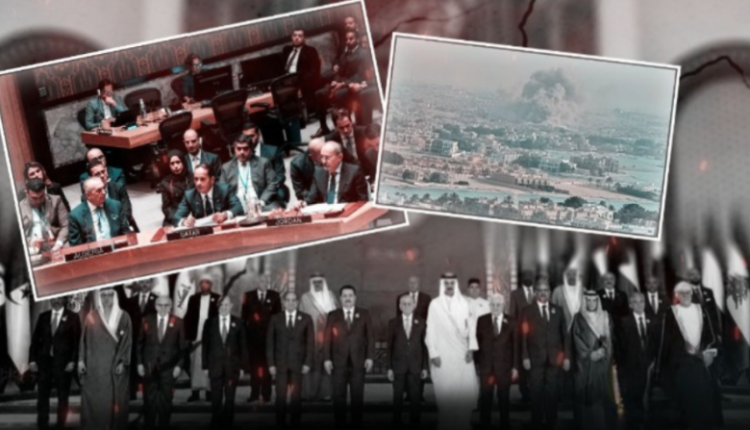The Doha Summit Deepens the Wounds of the Nation
In weak, castrated language shackled by constraints, the Arab-Islamic summit in Doha concluded its sessions on how to respond to the brutal and humiliating Israeli aggression against the State of Qatar.
For two days, Arab and Islamic peoples awaited the summit’s outcomes, hoping that ruling regimes might make up—in the face of Israeli aggression on Qatar—for what they had failed to do in defending Gaza. But, unfortunately, the reality was otherwise. Had the final communiqué not been broadcast with sound and image, no one would have believed that this was the position for which the leaders of 57 Arab and Islamic states had convened, supposedly to respond to the brazen Israeli aggression on Qatar.
No Severance, No Freezing
The outcomes of the Doha Summit were a shock in every sense of the word. It became undeniably clear that Arab and Islamic leaders were too afraid to send any signal that could be interpreted by America or “Israel” as hostile.
While peoples expected the summit to issue decisions commensurate with the gravity of the moment—which at minimum required severing all forms of relations with the Israeli occupation before moving to prepare for a military confrontation with the Zionist entity—the summit’s conclusions proved flimsy and disappointing, unanimously rejected by the peoples of the Arab and Islamic world.
The Danger of Capitulation
The summit limited itself to issuing a non-binding call to what the statement described as “reviewing diplomatic and trade relations with the Israeli occupation.” This prompted observers to ask: were the leaders of 57 Arab and Islamic states unaware that Israel is committing mass extermination in Gaza, and that Qatar itself had just suffered a blatant Zionist assault a week ago—an assault whose barbarity surpassed every law and norm, posing a grave threat that will eventually spare no one?
From the perspective of many observers, such feeble stances are themselves dangerous, as they display weakness that emboldens the enemy to go further and attempt what it would never have dared before.
Thank You, Qatar
The fifth clause of the summit communiqué was dedicated to “praising the civilized, wise, and responsible stance taken by the State of Qatar in dealing with this treacherous attack, its firm adherence to international law, and its insistence on safeguarding its sovereignty and security while defending its rights through all legitimate means.” Based on the context of the summit’s outcomes, this can be translated as: “Thank you, Qatar, for sparing us the burden of cutting ties, expelling Israeli ambassadors, or freezing relations.”
Once Is Enough
In light of repeated Israeli statements about intentions to strike Qatar again—or another Arab state—the Arab and Islamic leaders contented themselves with warning Israel not to repeat such attacks. They seemed to forget that certain events, if they occur once and are met with no deterrent reaction, become liable to repetition until they turn into a routine occurrence. Sovereignty and dignity, if not defended at the right moment, become ever more costly to reclaim later. Political science teaches that for states, there is no such thing as “next time.” There is only “once,” after which everything collapses.
Wagering on Disappointment
The justification offered by the Arab League’s assistant secretary-general—that “what the Doha Summit produced was the best possible under the current circumstances”—reveals the complacency of Arab and Islamic regimes, who believe the situation is temporary and will resolve itself once Netanyahu’s far-right government falls in the next elections. What they fail to realize is that the weakness displayed by Arab and Islamic regimes is in fact a test of how far Israel can go in pursuing policies of humiliation and violating sovereignty. This is unlikely to change with a change in Israeli governments, especially now that Netanyahu’s policies have already dragged Arab sovereignty and independence into a dark tunnel.
No Mask Left — America Is Israel
Coinciding with the Doha summit, U.S. rhetoric reached a point where it became impossible to distinguish between America and Israel. Washington dropped its masks, speaking openly as a party fully aligned with the occupation, not a mediator. President Trump stated clearly during the summit: “I told Netanyahu that when we attack others, we must be very careful.” His use of the plural “we” was meant to erase any doubt that the United States is anything other than Israel itself. Axios even quoted a senior Israeli official confirming that Trump was informed of the strike before the missiles were launched, that he discussed it with Netanyahu, and did not object. Yet these facts—which are only the tip of the iceberg—did not prevent Arab leaders gathered in Doha from thanking the United States as one of the sponsors of negotiations alongside Qatar and Egyp

